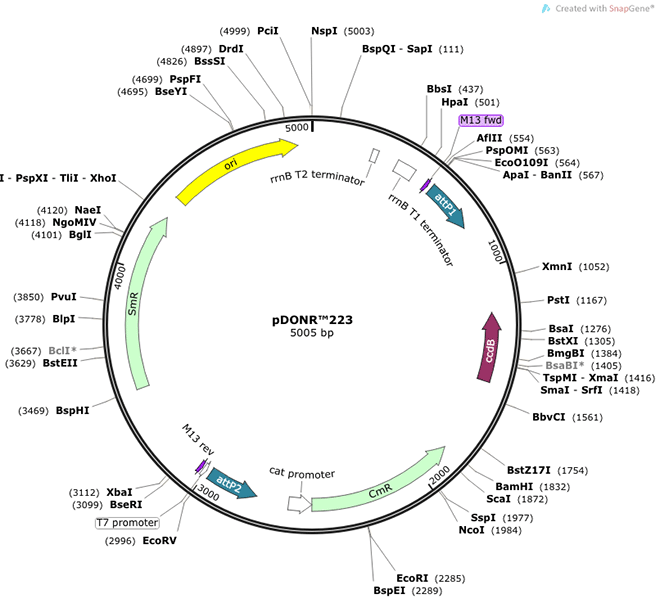This gene encodes tumor protein p63, a member of the p53 family of transcription factors involved in cellular responses to stress and development. The family members include tumor proteins p53, p63, and p73, which have high sequence similarity to one another. This similarity allows p63 and p73 to transactivate p53-responsive genes causing cell cycle arrest and apoptosis. The family members can interact with each other in many ways, including direct and indirect protein interactions. This results in mutual regulation of target gene promoters. Tumor protein p63 -/- mice have several developmental defects which include the lack of limbs and other tissues, such as teeth and mammary glands, which develop as a result of interactions between mesenchyme and epithelium. Both alternative splicing and the use of alternative promoters result in multiple transcript variants encoding different protein isoforms.[provided by RefSeq, Dec 2009]
小鼠 Trp63 (NM_001127262) cDNA克隆
| Accession: | NM_001127262 |
|---|---|
| 基因名称: | Trp63 |
| 基因别名: | Ket; P63; P73l; Tp63; P51/P63; AI462811; Trp53rp1 |
| 基因描述: | Mus musculus transformation related protein 63 (Trp63), transcript variant 6, mRNA. |
| 种属: | Mouse |
| CDS区长度: | 1386 (查看编码区序列) |
| 翻译后氨基酸长度: | 461 (查看氨基酸序列) |
| Transcript Variant: | This variant (6) is an alternate promoter product; it lacks several 5' exons and an internal exon in the 3' region, but has an alternate 5' exon, as compared to variant 1. The resulting isoform (f, also known as DNp63beta) has shorter and different N- and C-termini, as compared to isoform a. |
| 小鼠 Trp63 (NM_001127259) cDNA克隆 | transcript variant 1 |
| 小鼠 Trp63 (NM_001127260) cDNA克隆 | transcript variant 2 |
| 小鼠 Trp63 (NM_001127261) cDNA克隆 | transcript variant 3 |
| 小鼠 Trp63 (NM_011641) cDNA克隆 | transcript variant 4 |
| 小鼠 Trp63 (NM_001127264) cDNA克隆 | transcript variant 5 |
| 小鼠 Trp63 (NM_001127262) cDNA克隆 | transcript variant 6 |
| 小鼠 Trp63 (NM_001127263) cDNA克隆 | transcript variant 7 |
| 小鼠 Trp63 (NM_001127265) cDNA克隆 | transcript variant 8 |


